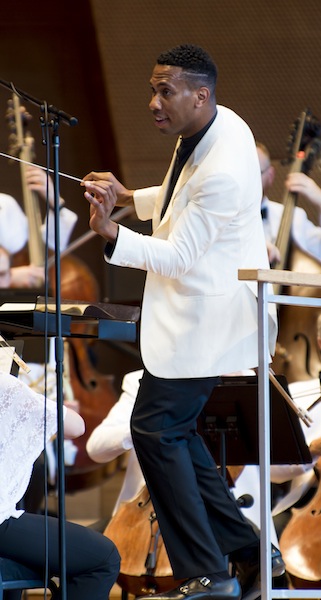Cox leads Grant Park Orchestra in lighter works by Beethoven, Haydn

The Grant Park Orchestra experience often includes generous doses of the unexpected. Management is refreshingly willing to explore lesser known corners of the repertoire, and patrons have come to expect every possible variation in Chicago’s famously volatile weather.
But Wednesday night’s concert in the Pritzker Pavilion under guest conductor Roderick Cox was an anomaly in most respects, with perfect temperatures under cloudless skies and a program of familiar, often witty music capably rendered.
Beethoven’s “Eroica” symphony (No. 3) may have changed history as much as any work in the canon. But his Symphony No. 2 in D major has more than its share of charms and novelties, if in a smaller package. The Second is filled with humor and unexpected twists, only a few of which were convincingly underlined in Cox’s reading.
The slow introduction to the first movement flowed amiably, emphasizing its gracious lyrical content if underplaying the equally essential sense of foreboding. While Beethoven’s sudden dynamic shifts were too often telegraphed in the Allegro proper, the conductor’s clear, incisive beat kept the virtuosic string passages in impressive unanimity.
The shapely clarinet solos of Robert Walker were a highlight of the second movement, even as the pacing overall seemed hurried and rigid. After an oddly dour scherzo, the finale sprang to life, paced briskly and the music’s sharp elbows given unabashed life.
No composer employed wit as knowingly as Haydn, and his Sinfonia Concertante bristled with winks and nods under Cox and a stalwart quartet of soloists culled from the ranks of the orchestra. Save a few brief intonation lapses in the upper register from cellist Walter Haman, the foursome embraced Haydn’s virtuosic tests with precision and good-natured aplomb.
Concertmaster Jeremy Black was the charismatic leader, imbuing each passage in the opening Allegro with stylish verve and unassuming technical mastery. Harman and oboist Nathan Mills contributed artfully molded lyrical passages in the slow movement, and bassoonist Eric Hall’s fleet outbursts competed amusingly with Black’s gallant recitatives in the finale.
Cox seemed more at home in the grand gestures and long lines of Wagner’s Overture and Venusberg Music from Tannhäuser than in the evening’s 19th century works. There was an appealing sweep in the pacing and a well-judged flexible approach to tempo. Balances were nicely gauged, and GPO’s stalwart low brass contributed heroic choruses.
There were times when middle-range gestures seemed muddy, but this was probably more an artifact of amplification than any miscalculation from the musicians. David Gordon’s gutsy trumpet exclamations were exhilarating, and the horn section distinguished itself in the scenes of Wagner’s “unholy ecstasy.”
Markus Stenz conducts the Grant Park Orchestra 6:30 p.m. Friday and 7:30 p.m. Saturday. The program includes Detlev Glanert’s Frenesia, Schumann’s Symphony No. 1 (“Spring”) and Barber’s Violin Concerto with soloist Paul Huang. gpmf.org
Posted in Performances




